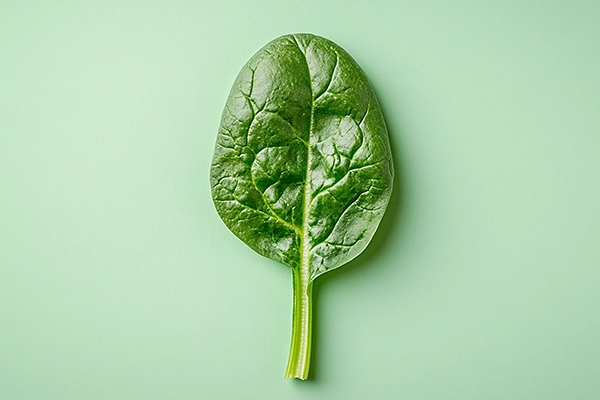Spinach, a leafy green vegetable, has long been celebrated for its exceptional nutritional profile and numerous health benefits. This article delves into the world of spinach nutrition, exploring its calorie content, nutrient density, and the myriad ways it can contribute to overall health and well-being.
Spinach Calories: Low in Energy, High in Nutrients
One of the most remarkable aspects of spinach nutrition is its low calorie content. With just 23 spinach calories per 100 grams, spinach is an excellent choice for those looking to maintain or lose weight without sacrificing nutritional value. This low calorie count, combined with its rich array of vitamins, minerals, and antioxidants, makes spinach a nutrient-dense food that offers significant health benefits without adding excessive calories to your diet.
The calorie breakdown of spinach is as follows:
- Spinach calories: 23 per 100g
- Water content: 91.4g per 100g
- Carbohydrates: 3.6g per 100g (including 2.2g of fiber and 0.4g of sugar)
- Protein: 2.9g per 100g
- Fat: 0.4g per 100g
This composition makes spinach an ideal food for various dietary needs, from weight management to nutrient supplementation.

Benefits of Spinach: A Comprehensive Overview
The benefits of spinach extend far beyond its low calorie content. This versatile vegetable offers a wide range of health advantages, making it a valuable addition to any diet. Let’s explore some of the key benefits of spinach:
1. Immune System Support
Spinach nutrition includes rich amounts of vitamins and antioxidants that play crucial roles in supporting the immune system. Notably, it contains:
- Vitamin C: A powerful antioxidant that stimulates the production and function of white blood cells.
- Vitamin A: Essential for maintaining the health of mucous membranes, which act as the body’s first line of defense against pathogens.
- Beta-carotene: A precursor to vitamin A that also acts as an antioxidant, protecting cells from damage.
Regular consumption of spinach can help strengthen the body’s natural defenses against infections and diseases.
2. Heart Health Promotion
The benefits of spinach for cardiovascular health are significant. Spinach nutrition includes:
- Nitrates: These compounds help improve blood flow and reduce blood pressure.
- Antioxidants: They protect blood vessels from damage caused by free radicals.
- Potassium: This mineral helps regulate blood pressure and reduce the risk of heart disease.
Including spinach in your diet can contribute to better heart health and reduce the risk of cardiovascular diseases.
3. Cancer Prevention
Spinach nutrition includes several compounds that have been linked to cancer prevention:
- Chlorophyll: This pigment that gives spinach its green color has been shown to have anti-carcinogenic properties.
- Lutein and Zeaxanthin: These carotenoids are associated with a lower risk of certain cancers, including breast and prostate cancer.
- Flavonoids: These antioxidants help protect cells from oxidative stress, which can lead to cancer development.
While more research is needed, the potential cancer-fighting properties of spinach make it a valuable addition to a health-conscious diet.
4. Eye Health Maintenance
The benefits of spinach extend to eye health, thanks to its high content of lutein and zeaxanthin. These compounds are essential for protecting the eyes from age-related macular degeneration and cataracts. Regular consumption of spinach can help maintain good vision and protect against common age-related eye conditions.
5. Bone Health Support
Spinach nutrition includes several nutrients crucial for bone health:
- Vitamin K: Essential for bone metabolism and reducing the risk of fractures.
- Calcium: Vital for bone strength and density.
- Magnesium: Helps regulate calcium levels and contributes to bone mineral density.
Incorporating spinach into your diet can contribute to stronger, healthier bones, especially important as we age.
6. Digestive Health Improvement
The high fiber content in spinach (2.2g per 100g) offers several benefits for digestive health:
- Promotes regular bowel movements
- Prevents constipation
- Supports the growth of beneficial gut bacteria
Additionally, the water content in spinach helps keep the digestive system hydrated and functioning properly.
7. Skin and Hair Health
The benefits of spinach extend to skin and hair health:
- Vitamin A: Promotes skin cell turnover and helps maintain healthy skin.
- Vitamin C: Essential for collagen production, which keeps skin firm and youthful.
- Iron: Crucial for hair growth and preventing hair loss.
Regular consumption of spinach can contribute to healthier, more radiant skin and stronger hair.

A Closer Look at Key Nutrients
To fully appreciate the benefits of spinach, it’s essential to understand spinach nutrition composition. Here’s a detailed look at some key nutrients found in spinach:
Vitamins
- Vitamin A: 469μg (52% of Daily Value)
- Vitamin C: 28mg (31% of DV)
- Vitamin K: 483μg (403% of DV)
- Folate: 194μg (49% of DV)
Minerals
- Iron: 2.7mg (15% of DV)
- Calcium: 99mg (8% of DV)
- Potassium: 558mg (12% of DV)
- Magnesium: 79mg (19% of DV)
Other Beneficial Compounds
- Lutein and Zeaxanthin: 12.2mg
- Beta-carotene: 5.63mg
- Quercetin: 4.86mg
This rich nutritional profile contributes to the numerous health benefits associated with spinach consumption.
Maximizing the Benefits of Spinach: Preparation and Consumption
To get the most out of spinach nutrition, consider the following tips:
- Raw vs. Cooked: While raw spinach preserves certain nutrients like vitamin C, cooking spinach can increase the bioavailability of other nutrients like iron and calcium. Include both raw and cooked spinach in your diet for optimal benefits.
- Pairing: Consume spinach with vitamin C-rich foods to enhance iron absorption. For example, add lemon juice to a spinach salad or pair spinach with bell peppers in a stir-fry.
- Storage: Store spinach in the refrigerator and consume within a few days to maximize its nutritional value.
- Variety: Incorporate different types of spinach (baby spinach, mature spinach) into your diet to enjoy a range of flavors and slightly different nutrient profiles.
Potential Considerations
While the benefits of spinach are numerous, it’s important to note a few considerations:
- Oxalates: Spinach is high in oxalates, which can contribute to kidney stone formation in susceptible individuals. If you’re prone to kidney stones, consult with a healthcare professional about your spinach consumption.
- Medication Interactions: The high vitamin K content in spinach can interfere with blood-thinning medications. If you’re on such medications, maintain consistent vitamin K intake and consult your doctor.
- Pesticides: When possible, choose organic spinach to minimize exposure to pesticides. If organic isn’t available, thoroughly wash conventional spinach before consumption.
Conclusion
The impressive spinach nutrition profile, combined with its low calorie content and numerous health benefits, makes it a valuable addition to any diet. From supporting heart health and boosting the immune system to promoting healthy skin and potentially fighting cancer, the benefits of spinach are wide-ranging and significant.
By incorporating spinach into your meals regularly – whether in salads, smoothies, or cooked dishes – you can harness its nutritional power and contribute to your overall health and well- being. Remember, a balanced diet rich in a variety of fruits and vegetables, including nutrient-dense options like spinach, is key to maintaining good health and preventing chronic diseases. Embrace the versatility and nutritional richness of spinach, and let this leafy green powerhouse play a starring role in your journey towards better health and vitality. being. Remember, a balanced diet rich in a variety of fruits and vegetables, including nutrient-dense options like spinach, is key to maintaining good health and preventing chronic diseases.
Embrace the versatility and nutritional richness of spinach, and let this leafy green powerhouse play a starring role in your journey towards better health and vitality.










